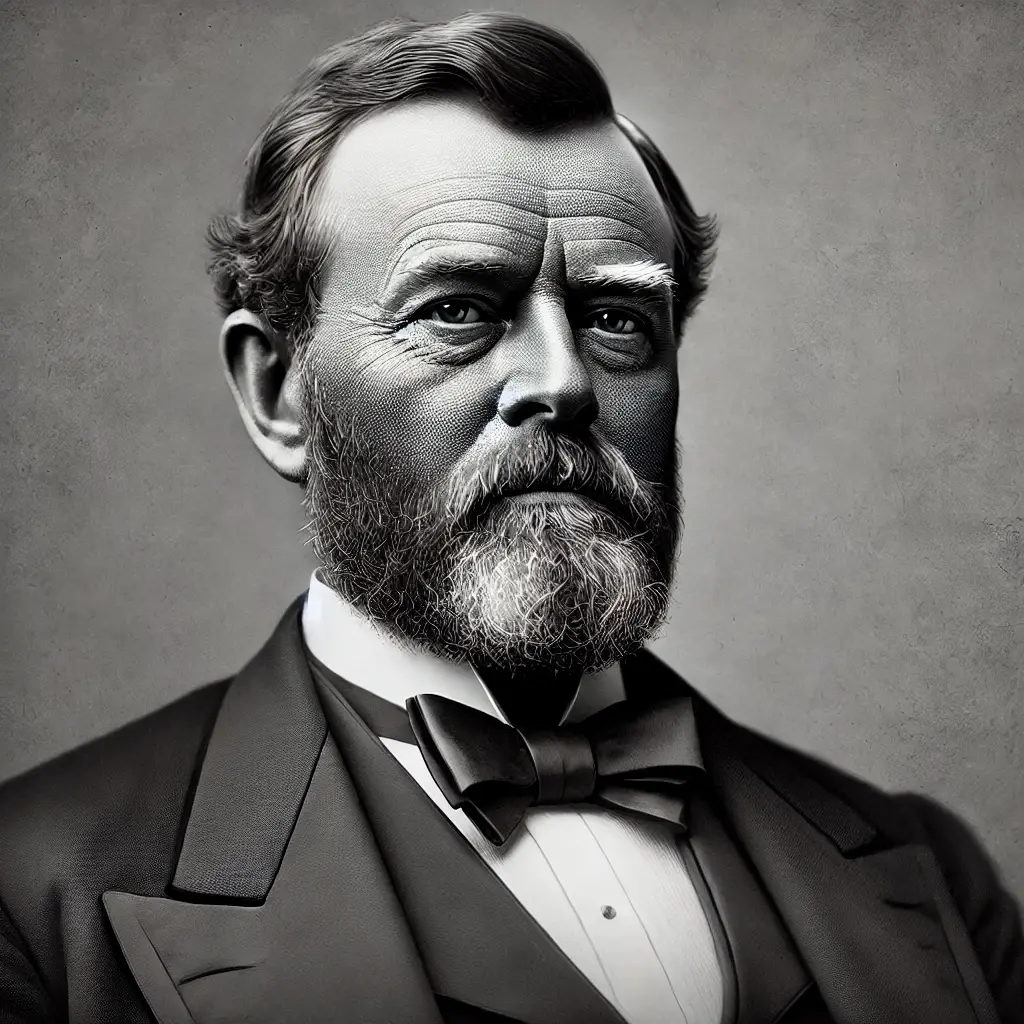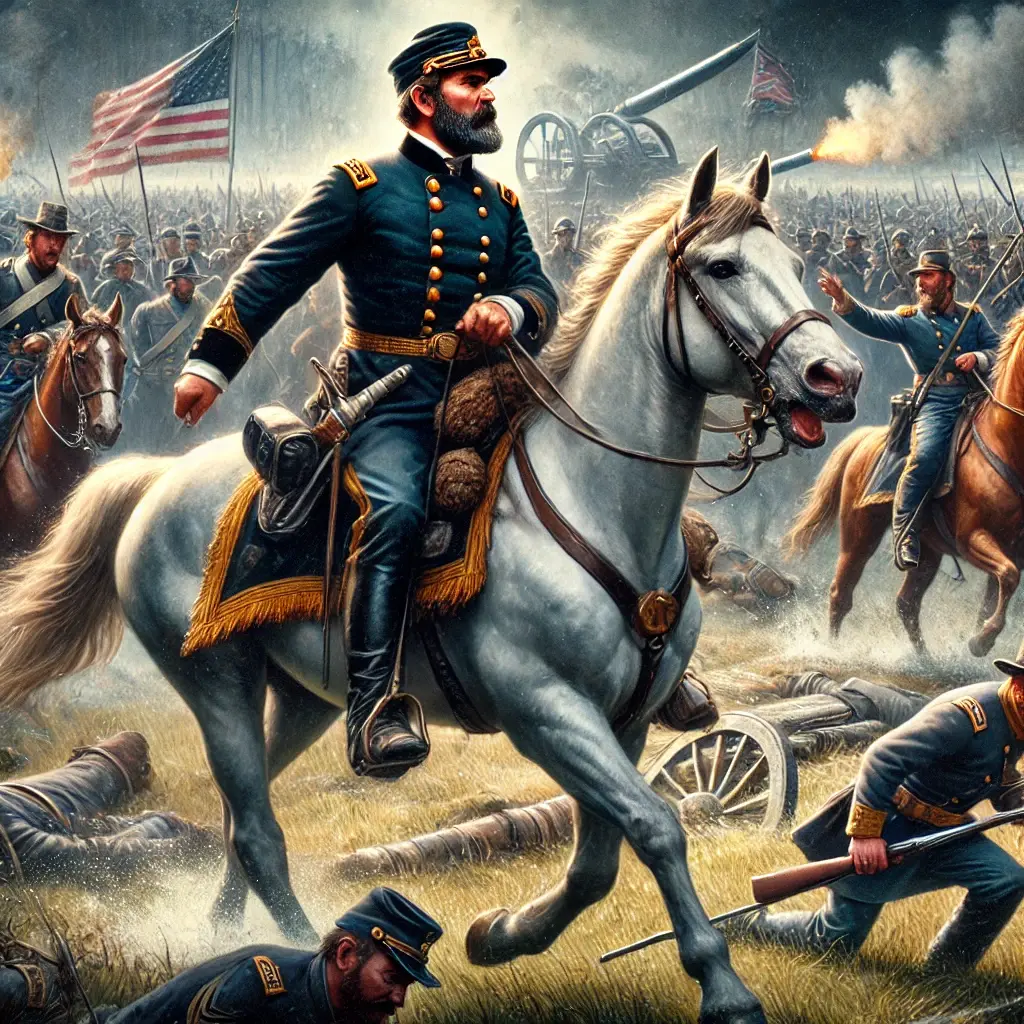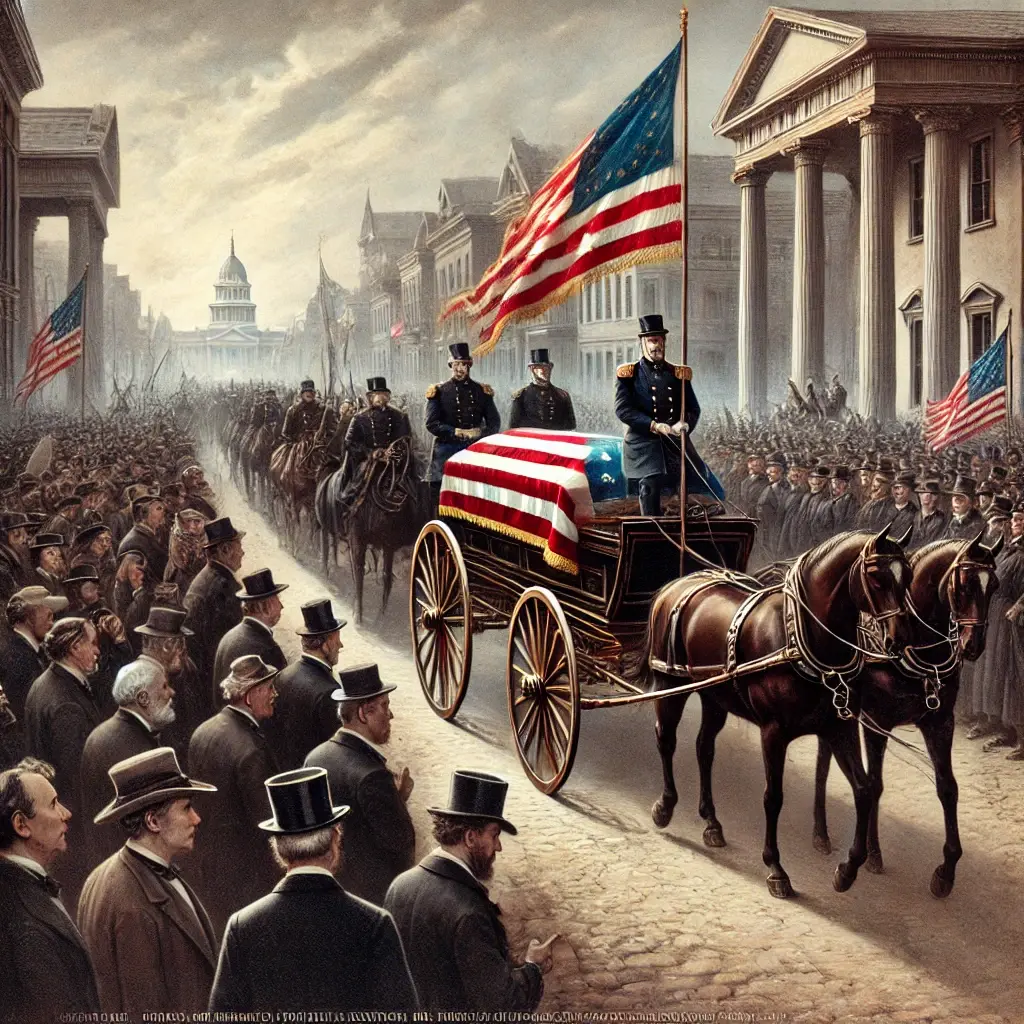On July 23, 1885, Ulysses S. Grant, the 18th President of the United States and a commanding general during the Civil War, died of throat cancer at the age of 63. Grant’s leadership during the Civil War helped preserve the Union, and his two terms as president were marked by both commendable efforts to reconstruct the post-war South and struggles against political corruption. His death was widely mourned as the loss of a national hero, and his memoirs, completed just days before his death, remain a significant contribution to American military literature.

Ulysses S. Grant was born on April 27, 1822, in Point Pleasant, Ohio. From humble beginnings, he rose to become one of the most revered figures in American history. His early life was marked by a series of challenges, including a stint at West Point where he was an unremarkable student. However, his experiences there laid the foundation for his future military career.
Grant’s initial military service during the Mexican-American War provided him with valuable combat experience. Despite his success in battle, he struggled with personal issues, including bouts of depression and alleged alcohol abuse. After the war, he resigned from the army and faced several years of financial hardship and failed business ventures.
The outbreak of the Civil War in 1861 marked a turning point in Grant’s life. Rejoining the army, he quickly demonstrated his military acumen and strategic brilliance. His early victories at Fort Henry and Fort Donelson in 1862 earned him national recognition and the nickname “Unconditional Surrender Grant.” These successes paved the way for his rise to command the Union Army.
Grant’s leadership was instrumental in key victories at battles such as Shiloh, Vicksburg, and Chattanooga. His relentless pursuit of Confederate forces and willingness to engage in total war tactics, which included targeting infrastructure and supply lines, were crucial in weakening the Southern war effort. In 1864, President Abraham Lincoln appointed him as the commander of all Union armies, a testament to his military prowess.
As the leader of the Union forces, Grant orchestrated a series of campaigns that ultimately led to the surrender of Confederate General Robert E. Lee at Appomattox Court House on April 9, 1865. This event marked the effective end of the Civil War and solidified Grant’s reputation as a war hero who played a decisive role in preserving the Union.
Following the war, Grant was hailed as a national hero, and his popularity propelled him to the presidency. He was elected as the 18th President of the United States in 1868 and served two terms from 1869 to 1877. His presidency focused on Reconstruction and efforts to integrate formerly enslaved people into American society. Grant supported the Fifteenth Amendment, which granted African American men the right to vote, and worked to suppress the activities of the Ku Klux Klan.
Despite his efforts to promote civil rights and economic development, Grant’s presidency was marred by numerous scandals and instances of corruption within his administration. His trust in associates and lack of political experience contributed to these issues, overshadowing some of the positive aspects of his tenure. Nevertheless, his administration’s commitment to Reconstruction and civil rights remains a notable aspect of his legacy.

After leaving the presidency, Grant embarked on a two-year world tour with his wife, Julia, where they were received with great honor and admiration. This tour helped restore some of his reputation and allowed him to enjoy a brief period of peace and recognition. However, his post-presidential years were soon plagued by financial difficulties, largely due to poor investments and a fraudulent scheme by his business partner.
In 1884, Grant was diagnosed with throat cancer, likely exacerbated by his lifelong habit of smoking cigars. Facing terminal illness and financial ruin, he began writing his memoirs to provide for his family after his death. Despite his deteriorating health, Grant worked tirelessly to complete the work, which was published by Mark Twain. The “Personal Memoirs of Ulysses S. Grant” was a critical and commercial success, praised for its clarity, humility, and insight into his military strategies.
Grant’s death on July 23, 1885, was met with an outpouring of national grief. His funeral in New York City was attended by thousands of mourners, including many Civil War veterans from both the Union and Confederate armies. This demonstrated the profound respect and admiration he commanded across the country. He was laid to rest in a temporary vault in Riverside Park, and later his remains were moved to the newly constructed General Grant National Memorial, commonly known as Grant’s Tomb, the largest mausoleum in North America.
Grant’s legacy as a military leader and president has been the subject of extensive historical analysis and debate. While his presidency is often criticized for its corruption scandals, his achievements in civil rights and his role in preserving the Union during the Civil War are widely acknowledged. Modern historians have taken a more nuanced view of his contributions, recognizing the complexities and challenges he faced in a deeply divided nation.
The completion of his memoirs, just days before his death, stands as a testament to Grant’s enduring strength and dedication. His writings provide an invaluable firsthand account of the Civil War and have been lauded for their literary quality and historical significance. They continue to be studied by scholars and history enthusiasts alike, offering insight into the mind of one of America’s most important military figures.
In addition to his military and political accomplishments, Grant’s personal qualities, such as his humility, perseverance, and resilience, have also been celebrated. Despite numerous setbacks and personal struggles, he remained committed to his principles and his country. His life story serves as an inspiration and a reminder of the potential for greatness through determination and hard work.
Grant’s contributions to American history are commemorated in various ways. Numerous monuments, schools, and institutions bear his name, reflecting the lasting impact of his service to the nation. His legacy is also preserved in the countless books, documentaries, and films that explore his life and achievements.
As a symbol of unity and reconciliation, Grant’s memory continues to resonate. His efforts to heal the divisions of the Civil War era and his advocacy for civil rights laid the groundwork for the ongoing struggle for equality in the United States. His life and career offer valuable lessons about leadership, integrity, and the importance of striving for a just and inclusive society.
The story of Ulysses S. Grant is a powerful chapter in the broader narrative of American history. From his humble beginnings to his rise as a military hero and president, his journey reflects the complexities and contradictions of the American experience. His enduring legacy reminds us of the profound impact one individual can have on the course of a nation’s history.
In his final days, Grant’s determination to complete his memoirs despite his suffering became a testament to his enduring spirit. This effort not only provided financial security for his family but also left a lasting historical document that offers profound insights into his thoughts and experiences.
Grant’s presidency also included efforts to stabilize the post-war economy, including the implementation of policies to return the nation to the gold standard. These economic policies were part of his broader vision to rebuild and modernize the United States after the devastation of the Civil War.
The dedication of Grant’s Tomb in 1897 was a major national event, attended by President William McKinley and numerous dignitaries. The monument stands as a symbol of the nation’s respect and admiration for Grant’s contributions to the country.

Grant’s influence extended beyond his lifetime, affecting subsequent generations of military leaders and politicians who looked to his example of leadership and resilience in times of national crisis. His life and legacy continue to be a source of study and inspiration in American military and political history.
The enduring interest in Grant’s life and career is reflected in the ongoing research and reinterpretation of his actions and policies, which continue to generate scholarly debate and public interest. His legacy, complex and multifaceted, serves as a reminder of the enduring challenges and triumphs faced by those in positions of leadership.
